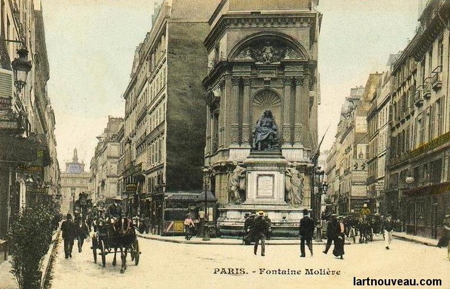Date: 14 April, 2015
“Literature IN Economics, and Economics AS Literature I: Bastiat’s use of Literature in Defense of Free Markets and his Rhetoric of Economic Liberty.”
A paper given at the Association of Private Enterprise Education International Conference (April 12-14, 2015), Cancún, Mexico. HTML and PDF.
The fountain dedicated to Molière on the rue de Richelieu, Paris where the publishing firm Guillaumin was located. They published all of Bastiat’s books.
Abstract: In this paper I will show how one economist used literature in creative and amusing ways to assist him in defending free trade and free markets from their intellectual and political opponents in France during the 1840s. The economic journalism which Frédéric Bastiat produced at this time is some of the best ever written and is still a model for economists today. His knowledge of both high and low French culture and literature was extensive, drawing upon the plays of Molière and the fables of La Fontaine at one end of the spectrum, as well as the political drinking songs and poems of Béranger at the other. These are all examples of Bastiat’s use of “literature in economics”.
In addition to being able to draw upon literature to illustrate his economic argument, Bastiat also had considerable skill in creating new formats with which to popularise economic ideas, such as dialogs, mini-plays, fake letters and petitions to government officials, economic tales or fables, parodies of classic works, utopian and dystopian stories of the future, and satirical poems. When mixed with his sharp humor, his puns, and sense of the absurd Bastiat created a unique “rhetoric of liberty” in order to fight his ideological battles against protectionism, socialism, and state privileges which enabled some favoured groups to benefit from their plundering of the tax-payers.
Two of Bastiat’s contributions will be noted in particular. Firstly, his use of the folk character Jacques Bonhomme, or the French everyman, who became an important character in many of his stories where he defended economic liberty as only a wiley French peasant or artisan could do, and who then became Bastiat’s virtual alter ego during the most violent and revolutionary phase of the 1848 Revolution. And secondly, Bastiat’s use of Robinson Crusoe from Defoe’s novel to invent an entirely knew way of doing economics – “Crusoe economics” – which was a major innovation in the way economists think about how individuals make economic decisions and which later became the foundation of “praxeology” in the Austrian school of economic theory.
In both of these areas, his new ways of popularizing economics and his invention of “Crusoe economics”, Bastiat has shown us how we might view “economics as literature.”

